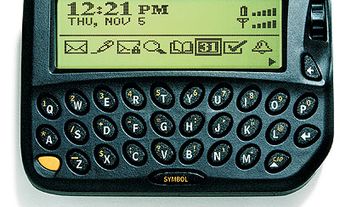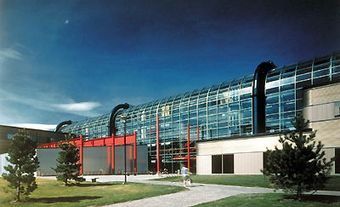Mihal (Mike) Lazaridis, OC, OOnt, FRS, entrepreneur, business executive, philanthropist (born 14 March 1961 in Istanbul, Turkey). Lazaridis studied electrical engineering at the University of Waterloo, where in 1984 he formed Research In Motion (RIM), the wireless technology firm that revolutionized the communications industry with the development of the BlackBerry (see BlackBerry Limited).

Early Life
Mike Lazaridis came to Canada with his Greek parents at age five and was raised in Windsor, ON. Lazaridis loved science as a child and was always fascinated by how things worked. He and his friends spent countless hours in their basements, building rockets, radios and many other things with a scientific underpinning. At the age of 12 he won an award for reading every science book in the Windsor Public Library. In high school, Lazaridis took science courses to be eligible for university but also enrolled in shop courses that allowed him to tinker.
Research in Motion
In 1979, he enrolled at the University of Waterloo, with profits from a re-designed buzzer for the popular game Reach For The Top. Doug Fregin, Lazaridis's close friend since childhood, was a fellow student. They founded Research in Motion (RIM), which was established as an electronics and computer science consulting business that later would focus on developing technology for the wireless transmission of data, such as email and text messages, and establishing wireless point-of-sale customer terminals (see BlackBerry Limited). They were soon joined by fellow student Michael Barnstijn. In 1986, while the young men were still students, RIM was awarded a $600,000 contract by General Motors.

In 1992, Mike Lazaridis was joined by Jim Balsillie as co-CEO. The blending of Lazaridis's technical vision and Balsillie's business acumen saw RIM expand from a small company with roughly 10 employees in 1992 to an international corporation worth in excess of $68 billion at the end of 2007. This success was largely due to the development of BlackBerry, launched in 1999. However, by 2007, the industry was moving forward, led by Apple and the iPhone it introduced that year. RIM continued to grow, reaching nearly $20 billion in sales during fiscal 2011, but only reluctantly incorporated new trends, such as a camera or MP3 player, in its smartphone.
Did you know?
Mike Lazaridis and Jim Balsillie were portrayed in the 2023 comedy-drama BlackBerry. Jay Baruchel played Mike Lazaridis in the film.
By the end of 2011, iPhones and Android phones had become more popular than Blackberry in Canada, the United States and the United Kingdom, and close to 60 per cent of RIM's sales came from other countries. RIM's growth began to slow and new consumers in emerging markets were purchasing lower-end devices. Complicating RIM's changing market was a major service disruption in October 2011, the fifth in five years. Despite the announcement of a new line of "superphones" to come in 2012, RIM suffered a drop in its stock prices of nearly 55 per cent. Shareholders called for change, particularly in the company's leadership.
After months of pressure, the executive shakeup was announced publicly on 22 January 2012. Balsillie and Lazaridis were replaced as co-CEOs by chief operating officer Thorsten Heins and their shared role as board chairman was assumed by Barbara Stymiest. Lazaridis assumed the new title of vice-chair of the board and chair of the board's new innovation committee, while Balsillie stayed on as a member of the board of directors until he resigned on 29 March 2012. A year later, on 28 March 2013, Lazaridis announced his retirement from the company he had founded three decades earlier.
Quantum Valley Investments
In March 2013, Mike Lazaridis and Doug Fregin established Quantum Valley Investments in Waterloo, Ontario. Quantum Valley Investments supports quantum computing ventures. (See also Computer Science.)
Philanthropy
RIM's success has allowed Lazaridis and his wife, Ophelia, to provide generous support to their community and country. The couple's philanthropy included a donation that established the Perimeter Institute for Research in Theoretical Physics, a donation to the University of Waterloo in 2004 to help establish the Institute for Quantum Computing, and an additional donation to the University of Waterloo in 2005, primarily to aid the construction of a new building jointly shared by the Institute for Quantum Computing and the Nanotechnology Engineering program.
Mike Lazaridis is an ardent advocate for higher education and scientific research. He has been a member of the Natural Sciences and Engineering Research Council of Canada (NSERC) and the Ontario Research and Innovation Council, a governor of the Information Technology Association of Canada and a member of the board of governors of the University of Waterloo. From 2003 to 2009 he was the university's chancellor.
Honours and Awards
Since founding RIM, Lazaridis has registered many patents and received dozens of awards for his innovations in wireless technology and software as well as for his philanthropy. Among his awards is a 1999 Academy Award for RIM's role in inventing a digital-barcode reader for film editing. He was awarded honorary doctorates by the University of Waterloo in 2000 and McMaster University in 2005. In 2002, Lazaridis and RIM colleague Gary Mousseau shared Canada's most prestigious innovation prize, The Ernest C. Manning Principal Award. Also in 2002, Mike Lazaridis was named Canada's Nation Builder of the Year by readers of the Globe and Mail. In 2005, he was listed on the TIME 100 List of Most Influential People and was appointed to the Order of Ontario. He was named an Officer of the Order of Canada in 2006 and became a Fellow of the Royal Society (London) in 2014.

 Share on Facebook
Share on Facebook Share on X
Share on X Share by Email
Share by Email Share on Google Classroom
Share on Google Classroom










